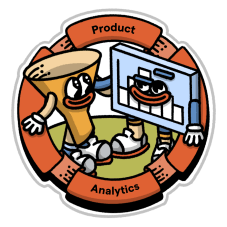Who are we building for?
Personas
- Primary Personas:
- Product engineer
- These are the engineers building the product. Normally full-stack engineers skewing frontend or frontend engineers.
- Product engineers have more limited time. Need to quickly get high-quality insights to inform what they are building and assess what they've shipped.
- Product manager (ex-engineer type)
- Supports the product teams (engineers, PMs, designers) to build the best products. They guide the product roadmap by speaking to customers and diving into the data.
- Product managers are the power-users of analytics (further evidence in the data analysis of paying users). They have desire and the time to go significantly deeper into the data.
- Limited focus:
- Not a focus but should be usable by:
- Everyone in the product team (less technical PMs, designers)
- Marketing
- Leadership team
What types of companies?
The highest-performing product teams building the most loved products at high-growth startups. For more context on the company read about the ideal customer persona.
Jobs to be done
Product analytics is a wide tool which fulfills many job-to-be-done (non-exhaustive list):
- Monitoring KPIs - how are the specific KPIs (product/team/company) doing? Are there any big changes, is everything going roughly in the right direction?
- Insights into a new feature you've built - I've created a new feature and I want to make sure that it's being used successfully
- Watching for errors and debugging - something went wrong (error gets trigger, product regression, drop in conversion), getting told it went wrong, debugging it, shipping a solution and making sure that fixes it
- Conversion optimization - the growth team is monitoring how particular KPIs are doing, trying to come up with experiments, shipping features to try and improve these
- Answering product strategy questions - which customers should we focus on, what are our most used/valued features. e.g. should we increase the pricing from X to Y? Which customers should we focus on?
You can broadly group the job-to-be-done of Product Analytics in PostHog as:
- Creating: You have a specific query/dashboard in mind, you open PostHog to view it. E.g. creating a dashboard to Monitor KPIs, or creating the funnel for your onboarding flow
- Consuming: you or someone else has made something in Posthog that you refer back to. E.g. Checking the dashboard you made to Monitor KPIs
- Exploring: you're answering a broader open-ended question. E.g. If you're monitoring your KPIs and you see something not right - you then want to dive into understanding why
Roadmap
3 year goals
- You can explore data across all insights and dimensions
- You can trivially share any insight anywhere
- Onboarding is as easy as a video game
- Tight integration with developer workflows
- No more complex than it is today
- Using PostHog sparks joy
- We support trillion event querying
Feature ownership
You can find out more about the features we own here


